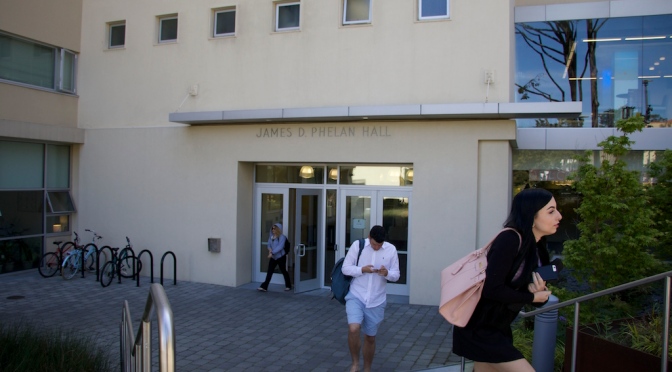Nureen Khadr
Staff Writer
A highly coveted residence hall on campus with a dark history behind its name, Phelan has a racially charged past that comes with its namesake. Built in 1955, Phelan Residence Hall was named for James D. Phelan, a three-time mayor of San Francisco from 1897 to 1902 and U.S. senator from California. He graduated with the class of 1881 when USF was still St. Ignatius College. These accolades might generally make the university proud to have him as an alumnus, but there has been a question as to why he was memorialized in such a manner to begin with. As a result, USF’s ASUSF Senate is presently working on a resolution calling for the University to consider changing the name of the dormitory.
Mayor Phelan’s vision for San Francisco is one that might be unbeknownst to many; he ran his reelection campaign on the slogan “Keep California White” establishing himself as a vocal anti-Japanese politician actively working to exclude them from Californian society. From his perspective, a beautiful San Francisco was one devoid of diversity and multiculturalism.
In 1912, he wrote in response to Asian immigration, “This is a whiteman’s country…We cannot make a homogeneous population out of people who do not blend with the Caucasian race.” Many of his racially charged rhetoric targeted Chinese and Japanese immigrants, as well as African-American residents whom he referred to as “a non-assimilable body, a foreign substance” on the U.S. Senate floor. He also delivered a speech during a special session of the California state legislature referring to Japanese migration as the “Yellow Peril”, while advocating in favor of their exclusion. Overall, he stood for the disenfranchisement and segregation of the marginalized, creating an us versus them dichotomy, even pointing to the birth rates of the Japanese population as something repulsive.
ASUSF’s Vice President of Mission, Shaya Kara, and Vice President of Advocacy candidate, Sean McCarthy, decided that a senate resolution was necessary to alert administration of students’ questions regarding the hall’s moniker. Kara said, “Well I had previously heard of these concerns from fellow students, but Sean, in particular, brought it up with me and we really started talking about the conflicting values that were at play. I decided that this would be a great statement to be made by a consolidated and thoroughly addressed resolution. Making this a formal document could help us in our efforts to change the name.”
Their mission is to ensure that the name is changed, using a more critically conscious process which considers leaders who are more deserving of the admiration and respect of the USF community. The fact that the SF Weekly named USF as a location “Where You Can Find Sites Named After Racist San Francisco Mayor James D. Phelan,” is something that Kara deems embarrassing for a university that claims to change the world from here.
As they compile the first draft of their resolution and gather the data necessary to support their call to rename the residence hall, they hope to complete and pass the resolution by the end of the academic year.
Kara said that there is great thematic emphasis on Jesuit values and social teachings in the document, especially the concept of “The Moral Dimension of Every Human Choice.”
“When the institution has physical representations of contributors to oppression while at the same time making strides towards equity and inclusion it seems like we aren’t being sincere here. We want our students to love a campus that is a reflection of them, a place they can really call a home,” said Kara.
Meanwhile, the University’s administration is just hearing of these efforts from several campus groups, but according to university representative Anne-Marie Devine Tasto, “Fr. Fitzgerald welcomes the discussion, and believes that a university is a perfect place for this kind of conversation.” He hopes that this becomes a university-wide discussion.
If the resolution is passed by Senate, the University’s administration will begin revising the commitments that were made in 1955 when the building was named. This step is necessary to avoid any legal issues that might prevent the change. The final decision would then be put to a vote by the USF Board of Trustees, bearing in mind the input of students, faculty, staff and alumni.
Kara and McCarthy, the student co-authors of this senate resolution, ask any community member with valuable information to add to the aggregation of this document to please contact them.
Photo courtesy of Racquel Gonzales/Foghorn

